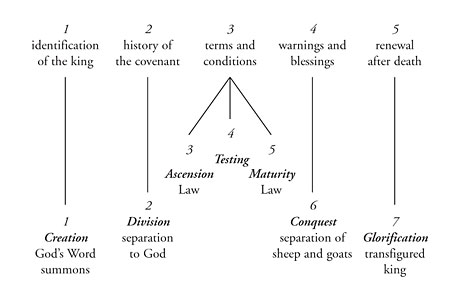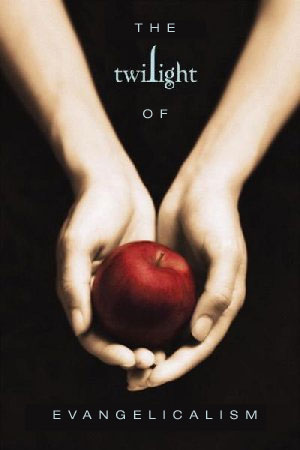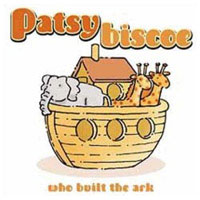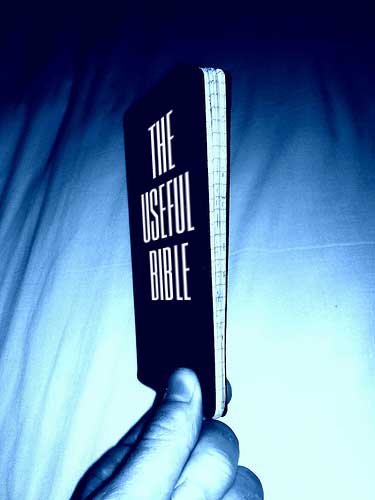Dec
18
2009
or The Crash of AD70

Now a river went out of Eden to water the garden, and from there it parted and became four riverheads. The name of the first is Pishon; it is the one which skirts the whole land of Havilah, where there is gold. And the gold of that land is good. Bdellium and the onyx stone are there. The name of the second river is Gihon; it is the one which goes around the whole land of Cush. The name of the third river is Hiddekel; it is the one which goes toward the east of Assyria. The fourth river is the Euphrates. (Genesis 2:10-14)
After the Herod and Shylock post, I had one complaint that the Worship as Commerce tag didn’t really do what it said on the tin, so I hope to capture it (briefly?) here. Now, where to start? As James Jordan explains, the idea begins in Eden.
Continue reading
1 comment | tags: AD70, Amalek, Gehenna, Genesis, Gnosticism, Herod, High Priest, Isaiah, Manna, Moses, Numbers 5, Revelation, Solomon, Temple, Worship as commerce | posted in Against Hyperpreterism, Biblical Theology, Christian Life, Creation, Ethics, Quotes, The Last Days, Totus Christus
Sep
25
2009

Today we had our final “Scripture” class at the high school for this term. After a summary of the term’s lessons and a final gospel presentation, students were asked to fill out a form and tick some boxes. It was encouraging to see how many students ticked the “I made a decision for God today” box (or words to that effect). And which kids tick that box is always very surprising. God is at work.
Which left us to decide what to do next term. We can’t just do the basics again (and believe me, the lessons we are doing now are kindy stuff). I suggested we challenge those who made decisions to join a church and get baptized. Look of horror from the Anglican teacher.
Continue reading
2 comments | tags: Baptism, Bible Matrix, Federal Vision, Gnosticism, Laver, Revelation | posted in Christian Life
Sep
22
2009
or Understanding Dominion by Covenant

The New Covenant is not about salvation. It is about dominion. Before you call in the inquisitors, have a look at this diagram from my book:

Continue reading
Comments Off | tags: AD70, Caleb, Covenant Theology, Dominion Theology, Feasts, Firstfruits, Gnosticism, Joshua, Judges, Moses, Passover, Postmillennialism, Ray Sutton, Revelation, Solomon | posted in Against Hyperpreterism, Biblical Theology, Christian Life, The Last Days, Totus Christus
Sep
10
2009
 God’s one Law for Adam was temporary. He could eat from the Tree of Judicial Knowledge when mature enough to carry the responsibility. God’s food laws for Israel were also temporary. [1] When the Christ came, and the people of God was brought to maturity, this restricted menu, too, was done away with. It was designed to be outgrown. Not many theologians understand this process of Adam’s “historical maturity”, so they come up with other theories to explain why many Bible truths are not “timeless”. Peter Leithart discusses comments by John Polkinghorne this week:
God’s one Law for Adam was temporary. He could eat from the Tree of Judicial Knowledge when mature enough to carry the responsibility. God’s food laws for Israel were also temporary. [1] When the Christ came, and the people of God was brought to maturity, this restricted menu, too, was done away with. It was designed to be outgrown. Not many theologians understand this process of Adam’s “historical maturity”, so they come up with other theories to explain why many Bible truths are not “timeless”. Peter Leithart discusses comments by John Polkinghorne this week:
Continue reading
Comments Off | tags: Gnosticism, Liberal theology, Peter Leithart | posted in Biblical Theology, Quotes
Aug
28
2009

“If the academies turned out faithful women armed with Picture Bibles we would be better off than we are with you lot.”
Once upon a time, not far from here, there was a graphic designer who busted a gut for five years teaching the Bible in a local high school. He was committed to building a biblical worldview through the communication of the exciting, terrifying, comforting narratives of the Old Testament as a foundation for the gospel, to a generation starving for this stuff and filling the gap with movies and novels like Harry Potter and Twilight. After all, postmoderns love narrative.
Continue reading
6 comments | tags: Biblical worldview, Compromise, Culture, Evangelicalism, Gnosticism, Satan | posted in Biblical Theology, Christian Life
Jul
26
2009

My friend Matt has been blogging about how postmodernism, with its openness to narrative, is a great opportunity for the gospel. But evangelicals need to sort themselves out first. Otherwise, to the world, they are just a bunch of Patsys. Patsy Biscoes that is.
Continue reading
4 comments | tags: Archaeology, Compromise, Gnosticism, Ideology, James Jordan, Liberal theology, N. T. Wright | posted in Apologetics, Biblical Theology
Jul
13
2009

or A Thimbleful of Watery Bible Broth
The Modernist Bible is very thin. The Old Testament is a mix of myth and history, and Revelation is just a general picture book of the gospel’s work in the world (or a polemic against first century Rome). It boils down basically to some key statements by Jesus and the letters of Paul. And even here, there are problems. Evangelicals love Paul because he communicates like a Greek, but even evangelicals choke on some things he says.
Continue reading
2 comments | tags: Compromise, Duane Garner, Gnosticism, Philosophy, Theistic Evolution, Tim Nichols | posted in Biblical Theology, Creation
May
2
2009
Peter Leithart writes:
Reflections on a class discussion earlier today about place, our connection to the ground, and gnosticism.
- Blood and soil are “powers” that can and have dominated human life, and caused lots of human misery.
- Jesus overcomes those powers. We are identified by water and feast, not by blood or color or place.
- YET (here’s where my thought is undeveloped): Jesus doesn’t just overcome and send the powers packing. He pacifies and reconciles powers; He turns them to the purposes of His kingdom (Col 1-2).
The dilemma: How to express the reconciliation of blood and soil without falling back into the old creation, and without going fascist? How to express Jesus’ pacification of “blood” without letting it usurp the place of the water, and how to express Jesus’ pacification of “soil” without letting it usurp the place of the feast?
Continue reading
Comments Off | tags: Atonement, Canaan, Communion, Compromise, Gnosticism, Herod, High Priest, Holy Place, Most Holy Place, nationalism, Nazirite, New earth, Nimrod, Peter Leithart, Worship | posted in Biblical Theology
Apr
28
2009
or How Modern Conservative Theologians Unwittingly Use Literary Genres to Mask Their Unbelief
One of the big problems with modern theology is its habit of categorising parts of the Bible into literary genres. For sure, the Bible contains historical prose, visions, poetry and songs. But many passages won’t actually fit into these neat little pigeon holes without hamstringing their intended purpose. And as it turns out, these “genre-lisations” are excuses to compromise with humanistic pop-philosophy and pop-history.
The three main gripes I have are misuses of the genres poetry, polemic and apocalyptic.
Continue reading
1 comment | tags: Apocalyptic, Daniel, David Field, Esther, Ezekiel, Gnosticism, Ideology, James Jordan, John Dickson, Peter Leithart, Restoration, Revelation, Rowan Williams | posted in Biblical Theology, Creation, The Last Days, The Restoration Era
Apr
15
2009
A great deal of the theological reflection on the nature of God (at least that which I come across) is human ruminations disengaged from most of the Bible, ie. the Old Testament. It gets treated as a vestigial organ bigger than the body it’s part of. Is this because the Old Testament conflicts more sharply with the modern and post-modern worldviews than the epistles?
Continue reading
2 comments | tags: Biblical worldview, Gnosticism, James Jordan, Old Testament | posted in Apologetics, Biblical Theology

































